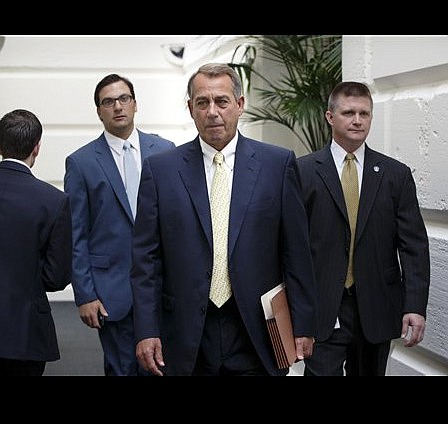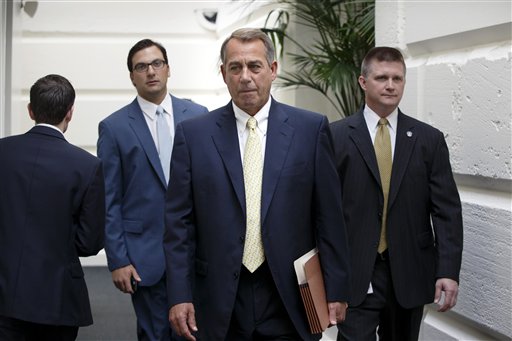MEMPHIS - It's too early to say the tea party's over.
But with a Senate majority in reach, the Republican Party and its allies are using campaign cash, positions of influence and other levers of power to defuse what they consider challenges by weak conservative candidates before the 2014 midterm elections and the 2016 presidential race. The party is cherry picking other candidates, including some who rode the tea party wave to a House majority in 2010. Some of those lawmakers are getting boosts from the very establishment the class vowed to upend.
It all adds up to an expensive and sweeping effort by national and state Republicans to blur the dividing line between factions that many believe cost the GOP the Senate majority and prolonged the 2012 presidential nomination fight. "We can't expect to win if we are fighting each other all the time," said Matt Borges, chairman of the Ohio Republican Party.
This year, Republicans are within six seats of controlling the Senate. If they win Senate control and keep their House majority, even deeper frustrations would await President Barack Obama in his final two years in office.
By changing rules at the presidential level and showering money and support on candidates in North Carolina, Georgia, Michigan and more states, Republican leaders are trying to drum out tea party-approved candidates they consider flawed - like ones who were seen as costing the GOP winnable Senate seats in Delaware, Missouri and Nevada in recent years.
"It makes sense to get control of the process," said Borges, who was attending the national Republicans' meeting in Memphis this week where officials were rewriting the rules on presidential debates.
Merging the factions is uncomfortable for all sides, and weighted heavily in favor of the well-financed and organized Republican Party, its state affiliates and allied groups like the Chamber of Commerce. In contrast, the tea party is a loosely affiliated group of conservative activists - some who now call themselves the "liberty movement" - who favor smaller government and a balanced budget. Public favor is waning for the firebrands, polls find. And as the Republican Party calculates how to cull the best of the tea party's candidates and energy, the activists are trying to figure out what they've won in the four-year-long struggle for control of the GOP.
Establishment candidates now "run on our message; they run as populists," said Daniel Horowitz of the conservative Madison Project, which has endorsed candidates in more than a dozen GOP primaries. "In one sense, it's frustration on our part. On the other, it shows that we're winning."
Said Matt Kibbe, whose FreedomWorks PAC opposes the re-election bids of Senate Republican Leader Mitch McConnell in Kentucky and Sen. Thad Cochran in Mississippi: "We organize grassroots to change the behavior of the people already in office. That's the whole point of participating in the primary process."
Public opinion suggests that some voters have tired of the tea party's cut-it-or-shut-it approach to governing after years of crises in which House conservatives' refusal to compromise brought the nation to the brink of a default and helped drive a partial government shutdown. A Gallup survey out Thursday found that about four in 10 Republicans and GOP-leaning independents classify themselves as supporters of the tea party, down from more than six in 10 - a high-water mark - in November 2010.
The Gallup survey follows an AP-GfK poll in March that found about one in five Americans supports the tea party, a modest improvement from public approval of the movement at the height of the government shutdown in October.
Looking ahead to 2016's presidential race, Republican officials meeting in Memphis are trying to figure out how to prevent a nominating contest that leaves an establishment-favored candidate battling tea party-styled longshots. Republican National Committee members are rewriting rules to shorten the nomination period and limit the number of debates.
An RNC panel on Thursday recommended a 13-member committee that would pick debate hosts and limit how many can take place. Candidates who participate in rogue forums would be banned from attending future, RNC-sanctioned debates.
The full RNC was set to take up the measure on Friday.
In effect, the tighter rules would make it more difficult for an outsider or under-funded candidate to find success.
In 2012, strong debate performances kept tea party-favored candidates such as Michele Bachmann, Newt Gingrich and Herman Cain in the running well past their viability. In all, 20 media-sponsored debates kept eventual GOP nominee Mitt Romney occupied fending off challengers well into the election year, rather than focusing early on Obama. In 2016, the goal would be for six to 10 debates before February or March.
"They're better off in the system," Saul Anuzis, a former chairman of the Michigan GOP, said of the political insurgents. "Just look at how the tea party has integrated within the RNC. They started out driven by anger but the best of them became part of the party."
Michigan Rep. Dan Benishek is one embraced by the establishment's allies. The 2010 firebrand who broke the Democrats' two-decade-old hold on his House seat won with 52 percent of the vote in part by slamming President Barack Obama's "socialist agenda." Benishek barely won re-election two years later. And in 2014, he's the star of an ad paid for by the U.S. Chamber of Commerce.
"Dan Benishek deserves our support," intones the narrator.
In the House and Senate contests, there's recent evidence that the Republican Party and their allied groups are winning the political tug of war.
In North Carolina on Tuesday, state House speaker Thom Tillis easily coasted past the 40 percent threshold for securing the nomination without a runoff with his challengers, who had cast him as a tool of the GOP establishment. In Ohio, House Speaker John Boehner shellacked his primary opponent despite being attacked as the very face of the deal-making powers.
In Tennessee, a challenge from the right came to nothing against Sen. Lamar Alexander. In South Carolina, class of 2010 Rep. Mick Mulvaney opted for a plum seat on the Financial Services Committee over a challenge to the deal-making Sen. Lindsey Graham and his $7 million campaign war chest. And in Michigan, establishment Republicans are piling behind a GOP opponent to Rep. Justin Amash, another 2010 tea partyer.
In Kentucky, home of tea party favorite Sen. Rand Paul, McConnell is cruising toward a decisive victory over conservative challenger Matt Bevin, after Bevin spoke at a rally organized to legalize cockfighting in the state.
Even Tea Party Nation, part of the loosely connected movement, is endorsing McConnell in the May 20th primary.
"Bevin is such a bad candidate that it makes it impossible not to support McConnell," wrote founder Judson Phillips, a former Tennessee prosecutor, in an email to supporters.

